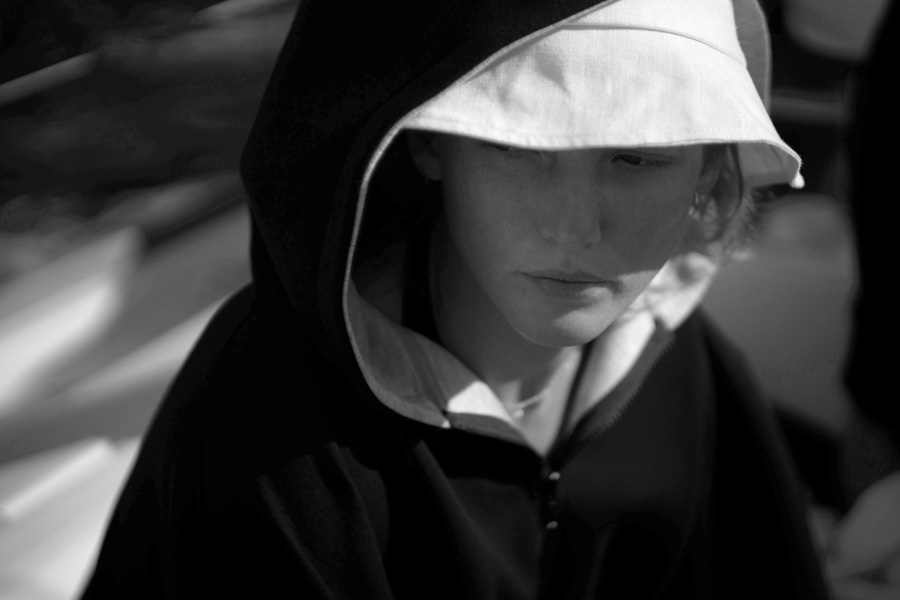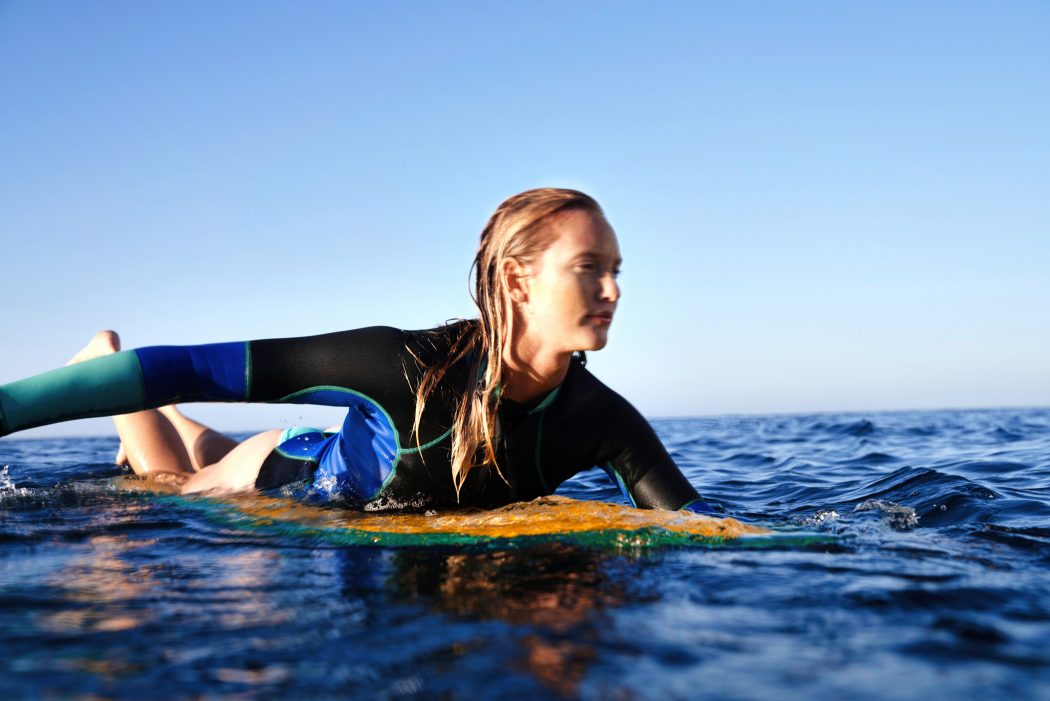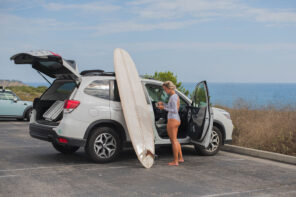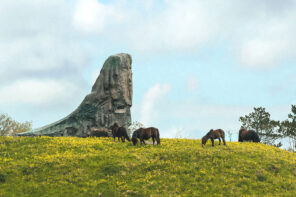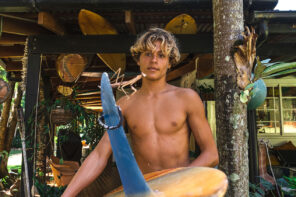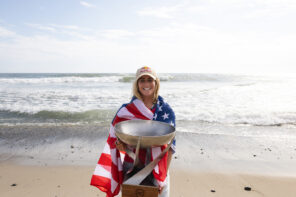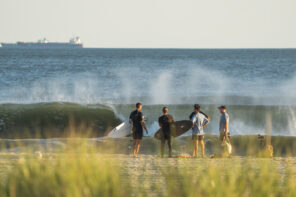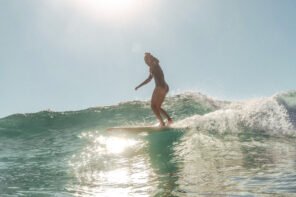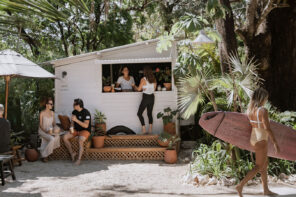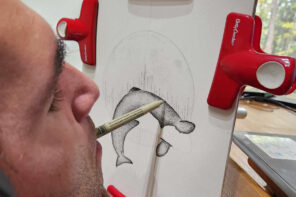Time to Upgrade from Neoprene: An Interview with Abigail Lorick of Ansea
Ok, I might be a little biased here, but Abigail Lorick has been killing it in the fashion design game pretty much since day one with her original line Lorick. You may know her also as the ghost designer for Eleanor Waldorf in Gossip Girl. Yeah, that show you binged before binging was a thing. Growing up with her in Jacksonville, Florida and then hanging throughout her wide swath of career accomplishments, I’ve always admired her commitment to doing something different in fashion and beyond, and always with her laid back, coastal vibe inherent throughout. Enter Ansea, her latest creation that marries sustainability and the water in a clean, minimalist clothing and wetsuit line made for women by women.
You may know her also as the ghost designer for Eleanor Waldorf in Gossip Girl.
Did you know that neoprene is pretty shitty for the planet? Hear no evil, see no evil right? Well, with the help of some pioneers in the materials space, Lorick is out to change what we (ok currently it’s only for women but let a guy dream, ok) wear in and out of the water. Her wetsuits are made from Yulex, which is a natural rubber made by tapping hevea trees which can be harvested over a period of about 30 years at which time the trees are converted into furniture. And the manufacturing of Yulex requires 80% less CO2 emissions than Neoprene. Ok I’m sold.
She’s focusing on where each material is sourced, how it’s made, delivered, and ultimately worn in this direct-to-consumer line. We caught up with Abigail during the launch of Ansea this week and learned a little more about why you should think twice about what you’re wearing in and out of the lineup.
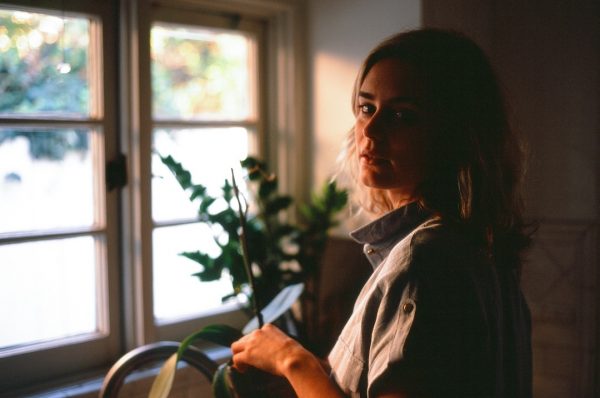
Abigail Lorick
Bronson Lamb: Well, I guess let’s start, I mean I’ve known you since middle school, but some people have not had that pleasure. Do you want to fill them in?
Abigail: Quick, yeah. I’ll condense it as quickly as I can. I went to FIT. Grew up in Jacksonville, Florida as a surfer, modeled in Europe, ended up in New York, went to FIT. Interned, got a job, met a great production manager who wanted to back my own line. Got my own line, Lorick. Was the ghost designer of Eleanor Waldorf on Gossip Girl, worked at Cynthia Rowley on her wetsuits and did a little bit of chief creative officer work there. And then went out to Stance to head up their women’s design and then eventually their entire design program. And then, most recently, was approached by Solera to launch a brand by women for women surf brand. That’s my career. That’s me, condensed. I think I did a good job there.
Bronson: That just reminded me, I forgot about the night … Remember when I was like 19 and we met up in Paris?
Abigail: Oh my God.
Bronson: We were at some weird jazz club on the Champs-Elysees or something.
Abigail: Oh my God, that was so crazy. I completely forgot about that. I forgot about that. But I do remember our time in New York and me playing the piano…
Bronson: The Algonquin.
Abigail: Algonquin, yes, yes. It was a good time. Good time. But they’re different, it’s not even like chapter, they’re like different books.
Bronson: Yeah, right? Exactly. That’s what makes life fun though.
Abigail: That’s really so true.
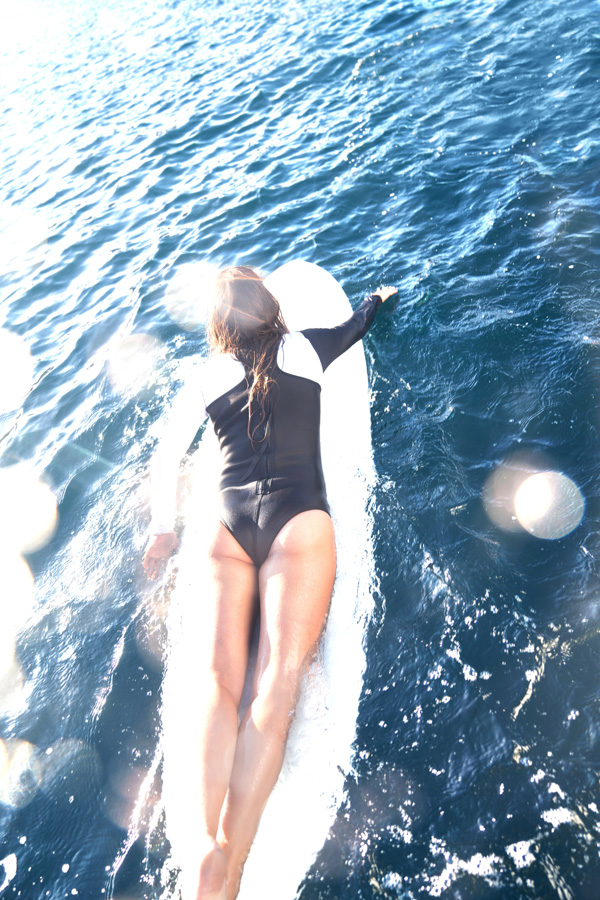
Bronson: What’s the genesis of Ansea? You just gave the quick, two-second version, but what’s your inspiration behind Ansea? Am I pronouncing it right? Ansea?
Abigail: Yeah, Ansea, “An-Sea.” It’s by women, for women. We use Yulex in our wetsuits and we use econyl in our swimwear. And I’m happy to tell you that Econyl is made from regenerated fishing line from the ocean and also carpet. And then, Yulex is the plant-based alternative to neoprene. And we’re not only sustainable within our fabrication and our packaging, but we’re also sustainable in our point of view, our design point of view. All of our swim and a lot of our ready to wear is reversible, so she can get more use out of her clothes.
And we also think about the woman being in the water, but also out of the water and all the different things she’s doing in her life, and being able to wear these products, like to the farmer’s market or out in the city or traveling. It’s more of the big picture of what the modern woman is doing today and the aesthetic. It’s clean, minimal, timeless. And we feel like that’s also a sustainable design approach.
It’s really interesting because Solera is a private equity firm. It’s women-founded and run by women. So this is perfectly aligned that they would want to do this brand. And they just saw a white space in the market for a by women, for women surf brand, because the action sports industry is so male-dominated.
I grew up on the water. I grew up sailing and surfing and living in that world. And then I had this strong career, this wonderful, fun career in fashion. And so, for me, this is like a dream job to be able to marry this passion of the water and fashion. And then the fact that we get to do it sustainably is just awesome.
I don’t think people really know how bad neoprene is for the environment.
Bronson: That’s really cool. Can you go into a little more about the recycled fishing lines and the wetsuit material? Is that what you were saying?
Abigail: Yeah. So the wetsuits are made from Yulex. Basically they tap into a tree, kind of like how you would get molasses out of a tree, but it’s a guayule shrub. The production of Yulex creates zero waste and it’s made from the guayule shrub. And the extraction kind of turns into a rubber material. And then all of the biomass is cogenerated plants and used for biofertilizers and garden soil. And it’s also “Grown within compliance of the Forest Stewardship Council standards.” So they rotate the crops and do all that stuff to make sure that it’s staying within the standards.
I don’t think people really know how bad neoprene is for the environment. And I didn’t even know until I started working on this project. It’s what they used to use to line landfills. So get it never biodegrades. It never goes away.
Bronson: All that stuff. I was reading this article in Powder Magazine a couple months ago, about Gore-Tex and the chemicals that were banned for being an environmental contaminate, and then they just changed, like, one ingredient in it, but it’s still the same thing, essentially, and they just lobbied until they got it passed through the system. So that’s awesome that you found an alternative for neoprene because I imagine that’s not [well known] in the industry.
Abigail: It’s not, and this material was created by Patagonia, and I think they worked on this for like five or six years. And if it wasn’t for them, we wouldn’t have this. And I do know also, that Patagonia is … I was just talking to Alex Yoder about this, who’s on the Patagonia team and they’re trying to figure out what to do. It’s really difficult to have performance attributes without using chemicals. So I think, like what you’re saying with Gore-Tex, we’re all trying to kind of figure out how we can be in these intense climates or in the water or whatnot and be protected without harming the environment. So I think everybody’s trying to kind of figure that out right now.
But we’re really lucky. And then econyl is made from regenerated fishing lines from the ocean, and carpets as well. They just take it and grind it up and then make the fabric from that. I think that one’s a little more common. A lot of the newer swim brands are using econyl. And we’re going to take it another step further and use it in our ready to wear. We’re going to be exploring that as well because it’s such a great fabric.

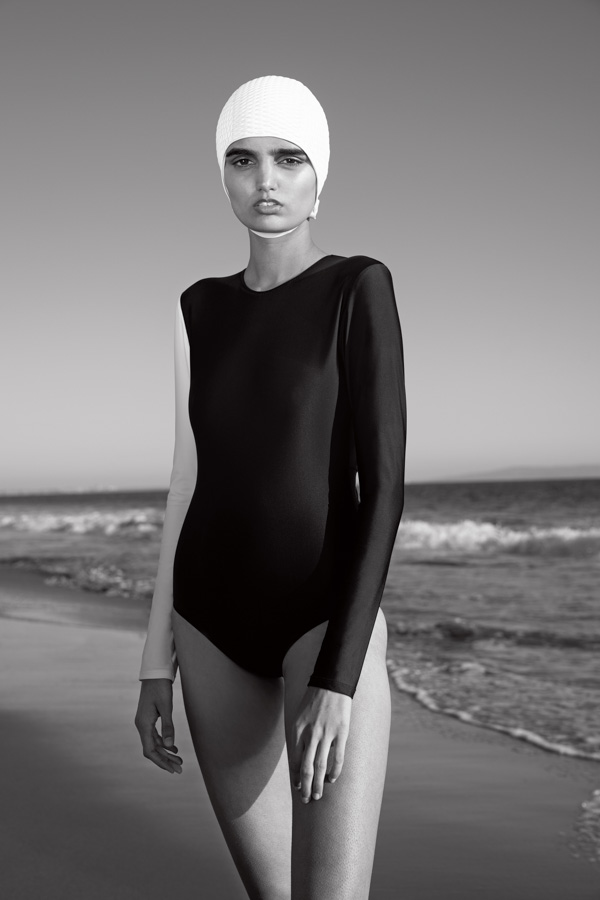
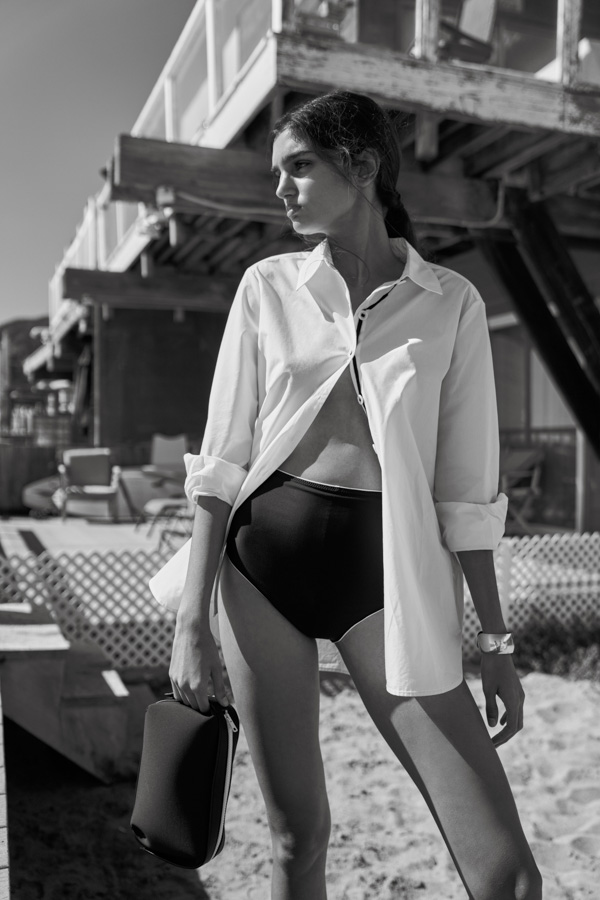
Bronson: What’s the timeline for, as you roll stuff out, do you already have everything produced or are you doing a few pieces at a time?
Abigail: We’re definitely following a drop cadence. We are not following a traditional fashion calendar. And each month we’ll be dropping new colorways and new styles and we’re going to keep it minimal and small and just kind of test and see what our girl needs and what she wants and make sure that we’re taking care of her and supplying her with whatever’s working for her.
The first year it’s direct to consumer, so it’s going to be a lot of learning. And then we’ll probably roll out, hopefully, a fun pop up, couple of coastal pop-ups, towards the end of the year or end of the summer and then look at brick and mortar the following year. But we’re in a really … The direct to consumer is so awesome because you can really learn who your consumer is and get to know her and have a dialogue with her. And it’s so awesome that we’re in that space now because back, five years ago, it wasn’t like that. Everything was in the hands of the retailer or the wholesaler.
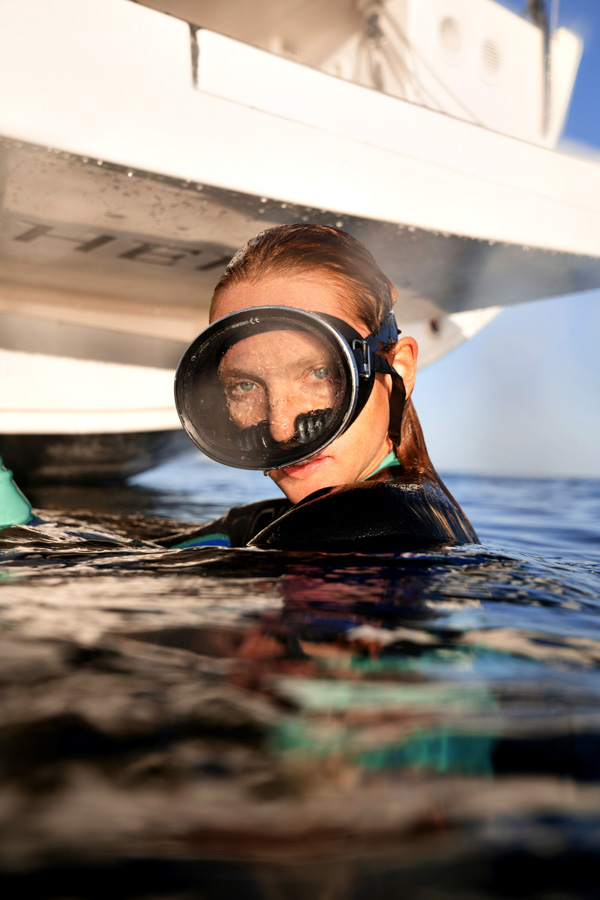
Bronson: I’m really interested in the sustainability side of it all, of course. Who are some of your inspirations, whether they’re companies, you mentioned Patagonia. Are there other people or athletes out there that are doing things that are really kind of, obviously adding to the fashion and retail culture, but also really being mindful of the environment and their impact?
Abigail: Yeah, that’s a good question. Definitely kudos to Patagonia. They are doing a lot of legwork for a lot of us and they’ve always been so open-source. They’re so open to sharing what they’ve learned. I mean, they’re a huge, huge inspiration and we’re really grateful for them. But really, I think honestly, we’re just a collective. Our generation and definitely the generations after us are moving into a space where we are all aware that we have to start living differently and more consciously, and that if you’re going to start something, any sort of business, it has to be sustainable.
You have to be thinking about what you’re doing in regards to the environment. So it feels more like the inspiration is just a collective consciousness that we’re all a part of. And I’m hoping that we all rally and shift into that space as much as we can. And yeah, it feels just like the right thing to do.
It feels more like the inspiration is just a collective consciousness that we’re all a part of.
And the other thing that I just want to add about the brand, that I’m really proud of, is we are inclusive on all levels. Like yes, we’re speaking to women who surf, but we’re also speaking to women who sail and women who snorkel and women who just go for a swim in their backyard pool. And so it’s across all activities, but also across all skill levels. So it doesn’t matter if you’re a beginner or if you’re a pro, we’re speaking to all women.
And that also then transcends, inclusivity for us also obviously means all ages, all sizes, all ethnicities. And currently, our line goes up to double XL and we’re going to definitely look to increase that and go larger in size when we have the right resources to do that. But I think that that’s also really important and a huge part of this brand, that I’m really proud of.
Bronson: That’s really great. And it’s also, I think going back to what you were saying in the beginning, of just increasing access to water no matter what you’re doing, as long as you’re appreciating it and taking care of it, that’s really cool to be a steward of.
Abigail: Yeah. And one thing we go back to is just, love the water. It’s about women who love the water and there’s such a beautiful community there. And also, I’m so excited to have events where we can open up that space. Because sometimes it can be intimidating for women to get in the water when there’s mostly men surfing and it can feel … It’s not an easy thing to just jump in. So really, I’m excited to open that space and get these groups of women together and go out in the water and like, support each other and build that community and enjoy that space for all of us.
